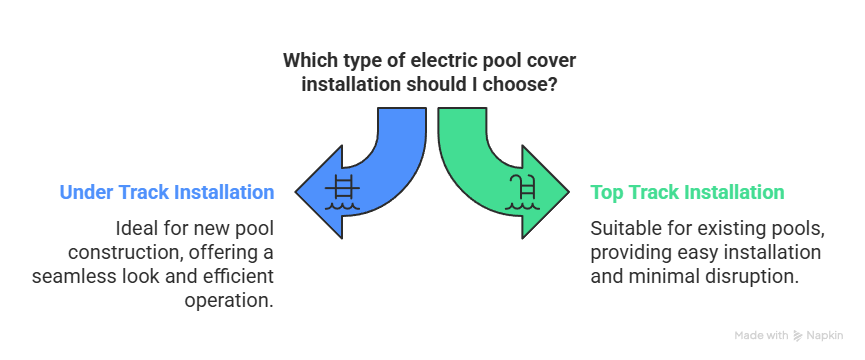Are you considering adding an electric pool cover to your swimming pool? These automated systems offer convenience, safety, and efficiency that manual covers simply can’t match. Let’s explore everything you need to know about electric pool covers, from installation options to smart features and cost considerations.

Key Takeaways
- Three main installation types exist for different pool situations
- Electric covers provide significant energy savings and enhanced safety
- Smart technology integration allows for remote control via apps
- Installation costs typically range from R15,000 to R45,000 depending on complexity
- Electric covers are ASTM F1346-91 compliant for maximum safety
What Are Electric Pool Covers and Why You Need One
Electric pool covers are motorized systems that automatically extend and retract a durable cover over your swimming pool at the touch of a button. Unlike manual covers that require physical effort to operate, electric versions use powerful motors to do the work for you.
Benefits of Installing an Electric Pool Cover
The advantages of electric pool covers go far beyond convenience:
- Safety: Creates a barrier that can support the weight of a child or pet
- Reduced evaporation: Cuts water loss by up to 95%
- Lower heating costs: Maintains water temperature more effectively
- Decreased chemical use: Less sunlight means fewer chemicals needed
- Reduced cleaning: Keeps debris out of your pool
Safety Features and Compliance with ASTM F1346-91 Standards
Quality electric swimming pool safety covers meet the ASTM F1346-91 standard, which means they can support the weight of multiple adults in an emergency. This crucial safety feature provides peace of mind for families with children or pets.
Energy Efficiency and Cost Savings
By reducing evaporation and heat loss, electric covers can save pool owners thousands of Rand annually on heating, water, and chemical costs. Many users report their covers paying for themselves within 2-3 years through these savings.
Types of Electric Pool Cover Installations for Different Pool Designs
There are three main installation options for electric pool covers, each suited to different situations:
Under Track – Under Mechanism (Recessed) Installation
This premium option is ideal for new pool construction or complete renovations.
Features and Components
The track is installed under the coping tiles or decking, with the mechanism housed in a concrete pit at the deep end of the pool. The result is a completely hidden system when not in use.
Advantages for New Pool Construction
- No visible obstructions around the pool area
- Preserves the aesthetic appeal of your pool environment
- Seamless integration with pool design
Maintenance Requirements
This installation requires minimal maintenance, with occasional track cleaning and mechanism inspection recommended annually.
Top Track – Under Mechanism Installation
This middle-ground option works well for partial renovations.
How It Works
Similar to the recessed installation, but the track is mounted on top of the coping while the mechanism remains below pool level in a specially constructed pit.
Benefits for Partial Pool Renovations
- Simpler installation than fully recessed systems
- Maintains a relatively clean look with only the tracks visible
- More affordable than fully recessed options
Installation Process
This installation requires some construction work to create the mechanism pit but is less invasive than a fully recessed system.
Top Track – Top Mechanism Installation
The most straightforward option for existing pools.
Best Solution for Existing Pools
If you have an existing pool and want to minimize construction work, this installation type is ideal. Both the tracks and mechanism sit on top of your existing pool deck.
Minimal Disruption Installation Process
Installation can typically be completed in 1-2 days with minimal disruption to your pool area.
Bench Covering Options
The visible mechanism can be covered with an attractive bench that provides seating while hiding the mechanics.
Smart Technology Integration for Modern Electric Pool Covers
Today’s electric swimming pool covers often include smart features:
Mobile App and Voice Assistant Control
Control your pool cover from anywhere using smartphone apps or voice commands through assistants like Alexa or Google Home.
Motion Sensor Technology for Automatic Operation
Advanced systems can detect approaching swimmers and automatically retract for added convenience and safety.
Battery Backup Systems for Power Outages
Never worry about power failures—backup batteries ensure you can still operate your cover during outages.
Advanced Features of Premium Electric Pool Covers
UV-Resistant Materials with Extended Warranties
High-quality covers feature UV-resistant materials that won’t degrade in the harsh South African sun, often backed by 10-15 year warranties.
Dual-Layer Insulating Designs for Heat Retention
Premium covers may include insulating air pockets between layers for superior heat retention and energy savings.
Integrated Water Drainage Systems
Sophisticated track systems include drainage to prevent water accumulation during heavy rains.
Solar-Powered Operation Options
Eco-friendly options use solar power to operate the cover mechanism, reducing electricity costs.
Choosing the Right Electric Pool Cover for Your Pool Shape
Solutions for Rectangular Pools
Rectangular pools are the easiest to cover with standard track systems that run parallel along the length of the pool.
Flexible Track Systems for Freeform Pools
Modern swimming pool cover rollers can accommodate curved or freeform pools using flexible tracking systems.
Custom Installation Considerations
Unusual pool shapes may require custom solutions, which specialists can design to fit virtually any configuration.
Maintenance and Care for Electric Pool Covers
Routine Cleaning and Inspection
Regular rinsing of the cover and tracks prevents debris buildup, while annual professional inspections ensure optimal operation.
Troubleshooting Common Issues
Most issues involve track obstructions or motor problems, which can often be resolved with simple cleaning or minor adjustments.
Winterization Procedures
In areas with seasonal changes, proper winterization protects your investment during the off-season.
Cost Considerations and Return on Investment
Initial Installation Expenses
Electric pool cover systems typically range from R15,000 for basic models to R45,000+ for premium installations with all the bells and whistles.
Long-Term Energy Savings
Most owners report 50-70% reductions in heating costs and significant savings on water and chemicals.
Increased Property Value
A quality electric cover is considered a premium feature that can enhance your property’s resale value.
Conclusion: Making the Right Electric Pool Cover Choice
Electric pool covers combine safety, efficiency, and convenience in one powerful package. By understanding the different installation options and features available, you can select the perfect system for your specific pool and needs. The initial investment pays dividends through energy savings, reduced maintenance, and enhanced safety for years to come.
Looking for swimming pool covers near me? Visit our website to find local installers and swimming pool covers for sale in your area.

